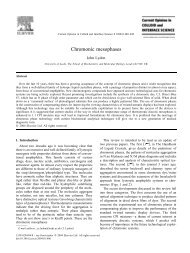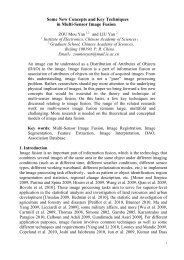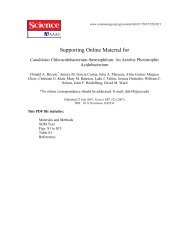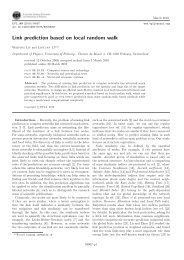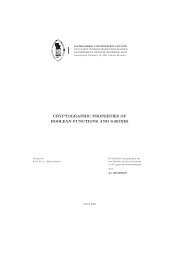- Page 1 and 2:
City of Light: The Story of Fiber O
- Page 3 and 4:
THE SLOAN TECHNOLOGY SERIES Dark Su
- Page 5 and 6:
3 Oxford New York Auckland Bangkok
- Page 7 and 8:
THE SLOAN TECHNOLOGY SERIES Technol
- Page 9 and 10:
viii PREFACE TO THE PAPERBACK EDITI
- Page 11 and 12:
x PREFACE bright and beautiful idea
- Page 13 and 14:
xii CONTENTS 13 A Demonstration for
- Page 15 and 16:
This page intentionally left blank
- Page 17 and 18:
4 CITY OF LIGHT reach across the wo
- Page 19 and 20:
6 CITY OF LIGHT Laser Focus. It was
- Page 21 and 22:
8 CITY OF LIGHT speech—300 to 300
- Page 23 and 24:
10 CITY OF LIGHT patients’ throat
- Page 25 and 26:
2 Guiding Light and Luminous Founta
- Page 27 and 28:
14 CITY OF LIGHT Figure 2-1: Collad
- Page 29 and 30:
16 CITY OF LIGHT Special Effects fo
- Page 31 and 32:
18 CITY OF LIGHT the British exhibi
- Page 33 and 34:
Figure 2-3: A mirror aimed light fr
- Page 35 and 36:
Figure 2-4: William Wheeler’s lig
- Page 37 and 38: 24 CITY OF LIGHT Total Internal Ref
- Page 39 and 40: 26 CITY OF LIGHT into glass bend in
- Page 41 and 42: 3 Fibers of Glass I do not believe,
- Page 43 and 44: 30 CITY OF LIGHT sington district o
- Page 45 and 46: 32 CITY OF LIGHT made: ‘‘All th
- Page 47 and 48: 4 The Quest for Remote Viewing Tele
- Page 49 and 50: 36 CITY OF LIGHT An Array of Light
- Page 51 and 52: 38 CITY OF LIGHT He never got that
- Page 53 and 54: 40 CITY OF LIGHT reading to a dista
- Page 55 and 56: 42 CITY OF LIGHT Lamm decided a bun
- Page 57 and 58: 44 CITY OF LIGHT He hurried to the
- Page 59 and 60: 5 A Critical Insight The Birth of t
- Page 61 and 62: 48 CITY OF LIGHT Figure 5-1: Total
- Page 63 and 64: 50 CITY OF LIGHT Corning Glass Work
- Page 65 and 66: 52 CITY OF LIGHT in 1925. He was a
- Page 67 and 68: 54 CITY OF LIGHT in single fibers.
- Page 69 and 70: 56 CITY OF LIGHT little known outsi
- Page 71 and 72: 58 CITY OF LIGHT Hopkins knew he ne
- Page 73 and 74: A good 6 99 Percent Perspiration Th
- Page 75 and 76: 62 CITY OF LIGHT school building eq
- Page 77 and 78: 64 CITY OF LIGHT dle, the longest y
- Page 79 and 80: 66 CITY OF LIGHT some weeks later,
- Page 81 and 82: 68 CITY OF LIGHT A Problem with Ima
- Page 83 and 84: 70 CITY OF LIGHT ble—among other
- Page 85 and 86: 72 CITY OF LIGHT bundles into facep
- Page 87: 74 CITY OF LIGHT Some applications
- Page 91 and 92: 78 CITY OF LIGHT phone, and asking
- Page 93 and 94: 80 CITY OF LIGHT Figure 7-1: Modula
- Page 95 and 96: 82 CITY OF LIGHT Figure 7-2: Alexan
- Page 97 and 98: 84 CITY OF LIGHT Newfoundland, whil
- Page 99 and 100: 86 CITY OF LIGHT long distance. The
- Page 101 and 102: 88 CITY OF LIGHT ways to modulate a
- Page 103 and 104: 90 CITY OF LIGHT Fibers as Dielectr
- Page 105 and 106: 8 The Laser Stimulates the Emission
- Page 107 and 108: 94 CITY OF LIGHT Maiman used ruby b
- Page 109 and 110: 96 CITY OF LIGHT Waveguides for Lig
- Page 111 and 112: 98 CITY OF LIGHT the potential of c
- Page 113 and 114: 100 CITY OF LIGHT profits. Nor were
- Page 115 and 116: 102 CITY OF LIGHT could not carry i
- Page 117 and 118: 104 CITY OF LIGHT costs, particular
- Page 119 and 120: 106 CITY OF LIGHT that was promisin
- Page 121 and 122: 108 CITY OF LIGHT date the fiber gu
- Page 123 and 124: 110 CITY OF LIGHT combination of wo
- Page 125 and 126: 112 CITY OF LIGHT lindrical claddin
- Page 127 and 128: 114 CITY OF LIGHT that fiber-optic
- Page 129 and 130: 116 CITY OF LIGHT Table 9-1 What De
- Page 131 and 132: 118 CITY OF LIGHT devices making bu
- Page 133 and 134: 120 CITY OF LIGHT Military Support
- Page 135 and 136: 122 CITY OF LIGHT A Budgetary Windf
- Page 137 and 138: 124 CITY OF LIGHT It’s a big chal
- Page 139 and 140:
126 CITY OF LIGHT it made eminent s
- Page 141 and 142:
128 CITY OF LIGHT Japanese companie
- Page 143 and 144:
130 CITY OF LIGHT reviewed optical
- Page 145 and 146:
132 CITY OF LIGHT silica stared him
- Page 147 and 148:
134 CITY OF LIGHT Fused silica was
- Page 149 and 150:
136 CITY OF LIGHT University of Wat
- Page 151 and 152:
138 CITY OF LIGHT pulling about 160
- Page 153 and 154:
140 CITY OF LIGHT worry about compe
- Page 155 and 156:
142 CITY OF LIGHT The few other fib
- Page 157 and 158:
144 CITY OF LIGHT Maurer also lost
- Page 159 and 160:
146 CITY OF LIGHT these nice low lo
- Page 161 and 162:
148 CITY OF LIGHT transistor electr
- Page 163 and 164:
150 CITY OF LIGHT Figure 12-1: The
- Page 165 and 166:
152 CITY OF LIGHT much that the las
- Page 167 and 168:
154 CITY OF LIGHT Figure 12-2: The
- Page 169 and 170:
156 CITY OF LIGHT Nick Holonyak, Jr
- Page 171 and 172:
158 CITY OF LIGHT Downs and Ups at
- Page 173 and 174:
13 A Demonstration for the Queen (1
- Page 175 and 176:
162 CITY OF LIGHT Marsh saw the pro
- Page 177 and 178:
164 CITY OF LIGHT A pair of wires c
- Page 179 and 180:
166 CITY OF LIGHT proposed, Bell co
- Page 181 and 182:
168 CITY OF LIGHT link switching ce
- Page 183 and 184:
170 CITY OF LIGHT meetings—until
- Page 185 and 186:
172 CITY OF LIGHT variation, althou
- Page 187 and 188:
174 CITY OF LIGHT bels. 93 All syst
- Page 189 and 190:
14 Three Generations in Five Years
- Page 191 and 192:
178 CITY OF LIGHT modest increase i
- Page 193 and 194:
180 CITY OF LIGHT The Rise of Irvin
- Page 195 and 196:
182 CITY OF LIGHT British Field Tri
- Page 197 and 198:
184 CITY OF LIGHT On March 27 Horig
- Page 199 and 200:
186 CITY OF LIGHT millions of bits
- Page 201 and 202:
188 CITY OF LIGHT Opening the 1.3-m
- Page 203 and 204:
190 CITY OF LIGHT pack of beer. The
- Page 205 and 206:
192 CITY OF LIGHT The Chinese also
- Page 207 and 208:
194 CITY OF LIGHT but the infusion
- Page 209 and 210:
196 CITY OF LIGHT In January 1980,
- Page 211 and 212:
198 CITY OF LIGHT contracts for sin
- Page 213 and 214:
200 CITY OF LIGHT munications was a
- Page 215 and 216:
202 CITY OF LIGHT elements. A call
- Page 217 and 218:
204 CITY OF LIGHT between them, and
- Page 219 and 220:
206 CITY OF LIGHT 1978, when they b
- Page 221 and 222:
208 CITY OF LIGHT of fiber together
- Page 223 and 224:
210 CITY OF LIGHT bles, and the Fre
- Page 225 and 226:
212 CITY OF LIGHT reaching the wate
- Page 227 and 228:
214 CITY OF LIGHT microwave counter
- Page 229 and 230:
16 The Last Mile An Elusive Vision
- Page 231 and 232:
218 CITY OF LIGHT rebuilding to pro
- Page 233 and 234:
220 CITY OF LIGHT transmission dist
- Page 235 and 236:
222 CITY OF LIGHT puter that showed
- Page 237 and 238:
224 CITY OF LIGHT Aftermaths of Ear
- Page 239 and 240:
226 CITY OF LIGHT Although fibers w
- Page 241 and 242:
228 CITY OF LIGHT it was time for h
- Page 243 and 244:
230 CITY OF LIGHT was selling fiber
- Page 245 and 246:
232 CITY OF LIGHT part of Lucent Te
- Page 247 and 248:
234 CITY OF LIGHT miles. Racks of e
- Page 249 and 250:
236 CITY OF LIGHT Today’s Technol
- Page 251 and 252:
238 CITY OF LIGHT on the overhead c
- Page 253 and 254:
240 CITY OF LIGHT innovators were c
- Page 255 and 256:
242 CITY OF LIGHT The erbium amplif
- Page 257 and 258:
244 CITY OF LIGHT sent signals at f
- Page 259 and 260:
246 CITY OF LIGHT the same type of
- Page 261 and 262:
248 CITY OF LIGHT ments. Nor could
- Page 263 and 264:
250 CITY OF LIGHT passed 10,000 for
- Page 265 and 266:
252 CITY OF LIGHT space. Anyone who
- Page 267 and 268:
254 CITY OF LIGHT they didn’t nee
- Page 269 and 270:
256 CITY OF LIGHT Like the fiber bu
- Page 271 and 272:
258 CITY OF LIGHT Bergano, Neal: Be
- Page 273 and 274:
260 CITY OF LIGHT Holonyak, Nick, J
- Page 275 and 276:
262 CITY OF LIGHT Norton, Frederick
- Page 277 and 278:
264 CITY OF LIGHT proposal for fibe
- Page 279 and 280:
266 CITY OF LIGHT 1887: Charles Ver
- Page 281 and 282:
268 CITY OF LIGHT 1956: First trans
- Page 283 and 284:
270 CITY OF LIGHT abandon thin-film
- Page 285 and 286:
272 CITY OF LIGHT 1971-1972: Focus
- Page 287 and 288:
274 CITY OF LIGHT September 1978: F
- Page 289 and 290:
276 CITY OF LIGHT February 1993: Mo
- Page 291 and 292:
This page intentionally left blank
- Page 293 and 294:
280 NOTES TO PAGES 13-17 6. Daniel
- Page 295 and 296:
282 NOTES TO PAGES 23-27 37. It was
- Page 297 and 298:
284 NOTES TO PAGES 35-39 4. H. C. S
- Page 299 and 300:
286 NOTES TO PAGES 44-50 of Munich
- Page 301 and 302:
288 NOTES TO PAGES 54-59 47. Lee Du
- Page 303 and 304:
290 NOTES TO PAGES 65-70 18. Court
- Page 305 and 306:
292 NOTES TO PAGES 74-80 way taken
- Page 307 and 308:
294 NOTES TO PAGES 88-91 35. Antoni
- Page 309 and 310:
296 NOTES TO PAGES 95-99 on Lasers
- Page 311 and 312:
298 NOTES TO PAGES 103-110 Chapter
- Page 313 and 314:
300 NOTES TO PAGES 119-123 that pro
- Page 315 and 316:
302 NOTES TO PAGES 129-140 59. See
- Page 317 and 318:
304 NOTES TO PAGES 147-151 of atten
- Page 319 and 320:
306 NOTES TO PAGES 155-159 1970); p
- Page 321 and 322:
308 NOTES TO PAGES 163-166 broadcas
- Page 323 and 324:
310 NOTES TO PAGES 168-171 51. Reev
- Page 325 and 326:
312 NOTES TO PAGES 174-178 95. A. G
- Page 327 and 328:
314 NOTES TO PAGES 183-186 37. Keck
- Page 329 and 330:
316 NOTES TO PAGES 192-197 76. Inte
- Page 331 and 332:
318 NOTES TO PAGES 202-208 3. Arthu
- Page 333 and 334:
320 NOTES TO PAGES 213-220 54. Davi
- Page 335 and 336:
322 NOTES TO PAGES 223-229 Sandbank
- Page 337 and 338:
324 NOTES TO PAGES 236-242 29. Tom
- Page 339 and 340:
326 NOTES TO PAGES 246-253 31. Kazu
- Page 341 and 342:
This page intentionally left blank
- Page 343 and 344:
330 INDEX Barlow, Harold 86, 110, 1
- Page 345 and 346:
332 INDEX Endoscopes 41-44, 51, 57-
- Page 347 and 348:
334 INDEX Index of refraction 24-26
- Page 349 and 350:
336 INDEX Møller Hansen, Holger 50
- Page 351 and 352:
338 INDEX Rocky Point Laboratory (R
- Page 353:
340 INDEX ULE glass 133-134 Ulexite



